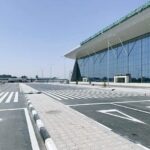Nigeria has recorded an improvement in the African visa openness index, as it is now number six in Africa, indicating that it is easier now to obtain visa from Nigeria.
According to African Development Bank (ADB) and other reports, visa openness refers to the ease with which travellers can obtain authorisation to travel to and enter a country, pending final determination by the destination immigration officials. This indicates that the more visa-open a country is, the easier it is for a traveller to visit that country.
ADB published Africa Visa Openness Index last year and observed that there is progress in visa openness in Africa to ease cross border travel, boost trade, investment and regional integration. Many countries in the region, including Nigeria, have embraced the new diplomatic behaviour and it is becoming more flexible in visa issuance.
Travel expert and the organizer of Akwaaba African Travel Market, ambassador Ikechi Uko, confirmed that Nigeria was listed as number six on the African Development Bank AfDB 2024 AVOI (Africa Visa Open Index).
He described the improvement as massive and observed that to be the 6th most open country in Africa out of 54 countries is important progress Nigeria had made.
“Seen before as a difficult country to visit by Africans, the continuous improvement is noteworthy. In January 2020, President Buhari announced that all Africans could visit Nigeria with a visa on arrival. Though it took some time to improve the process, eventually, Nigeria got it right. Even this year in September, with the advocacy of the former Minister of Tourism, Mrs Lola Ade-John and the Minister of Interior Olubunmi Tunji-Ojo; government dropped the Visa on Arrival fees by over 50%.
At the Vision 20:2020 project of the federal government, I was the head of the Tourism Subcommittee. My major presentation was on the introduction of transit visas for travellers coming to Nigeria. I promoted this in the media, especially Thisday Newspapers.
“The idea then was that Transit Visa will enable Nigerian airlines dominate West Africa and make Lagos airport hub. Then Virgin Nigeria provided the same day connections for Europeans going to the Gambia. They leave Europe on the 11 am. flight from Frankfurt, Brussels, Amsterdam, and Paris to Lagos. They took the night flight from Lagos to Banjul. I knew so many people who were on that route because there were no direct scheduled flights to The Gambia,” Ambassador Uko recalled.
He also recalled that even the South African World Cup made Lagos the connection with North America, noting that most professionals flew to Lagos on Arik and joined SAA to Johannesburg. It was the shortest route to South Africa.
“I had wanted to open up the Market for Tourism with a one day Transit Visa.
I was not very successful with that push. I was invited by the Nigerian Immigration Service (NIS) to send a paper on the impact of transit visa. In 2015, I started bringing a large number of foreigners for Akwaaba African Travel Market and Carnival Calabar. NIS was gracious to grant visa on arrival for most of my visitors, he said.
In a kind of rhetorical question, Ambassador Uko wanted to know the impact of visa openness and whether Nigeria is exploiting the benefits of this improvement. He explained that there are benefits to improved visa openness and these include improved tourism receipts and disclosed that Rwanda ,Gambia, and the Seychelles are true tourism success stories based on visa openness.
“Going through the list of countries in Africa, you will see that countries with tourism contributing over 40% to export income are also in the top 10 on the AVOI list. Ghana has issued an order allowing all visitors to apply for a visa on arrival from the 1st of December until the 15th of January 2025, in order to generate more tourists for the already successful December in Ghana Tourism project.
“Nigeria might not benefit tourism wise because there is no national plan to attract African tourists. Lagos, Cross River, and a few other states have been marketing gl9bally but not at the scale expected from a big country like Nigeria.
Compared to Rwanda, Ghana, Kenya, South Africa, and the Gambia, Nigeria is yet to start. Hopefully, the country will wake up soon,” Ambassador Uko said.

The second benefit, Uko pointed out, is the creation of aviation hub. According to him, with the success of the Arik and Virgin Nigeria experience, the visa openness will be a huge advantage like Rwanda, Ethiopia, and Dubai had done, remarking that Nigeria now has the right visa policy, but Nigerian airlines has regressed in importance.
“Air Peace hasn’t been the perfect to Arik as it has not connected as many places as Arik once did. Most Cameroonians in America still fly through Lagos, connecting on Arik and ASKY to Cameroon. Ibom Air has not yet stepped into the shoes of Virgin Nigeria with West African connections. It flies only to Accra on the West Coast.
“Our airport has not improved its connectivity since 2010, even with the new Chinese built airports in Abuja and Lagos. There are no top quality transfers and interlining desks and sections at our airport. In the last one year, I have travelled through, Lagos, Abuja,Cotonou, Accra, Lome, Abidjan,Banjul and Dakar Airports and I know of those airports have better transfer connections than Lagos or Abuja,” Uko stated.
The third benefit, he pointed out is MICE (Meetings, Incentives, Conferences & Exhibitions) and described it as the new bread and butter for most countries. Ambassador Uko pointed out that Kigali shot up to the second biggest MICE destination in Africa after Cape Town based on visa openness.
“I saw this growth happen before my eyes. In 2014, I was honoured in Rwanda with one of the highest Awards. I named a Gorrilla. Then, the whole MICE project was at its beginning, and I knew the team that worked on the project. Today, it is drawing millions of dollars to Rwanda. Ghana is using 5th Freedom as a strategy to grow its airport as a hub. What is the airline and airport strategy for Nigeria? Now, we have the right policy for visa openness,” he said.
He noted that Nigeria has no MICE strategy that is well known, remarking that he is fully involved in MICE activities in Africa and noted that Meetings Incentives Conferences and Events are the lowest hanging fruits for most countries.
The fifth benefit of visa openness is related to trade and cargo. Ambassador Uko observed that when people move trade moves, remarking that when trade moves cargo moves.
“We are still far from becoming an air cargo logistics hub. Do we have a trade policy for Africa? The Nigerian AfCFTA coordination office is making efforts to support Nigerian Export Promotion Council (NEPC), the Federal Airports Authority of Nigeria (FAAN), and Nigeria Agriculture Quarantine Service (NAQS) to derive benefit from the abundant opportunities available for Nigeria. It is expected that all these plans are coordinated towards a common goal. I will end this by suggesting that Nigeria develop an overarching national strategy to connect the dots and grow its economy based on the policy of the visa openness,” Ambassador Uko said.







